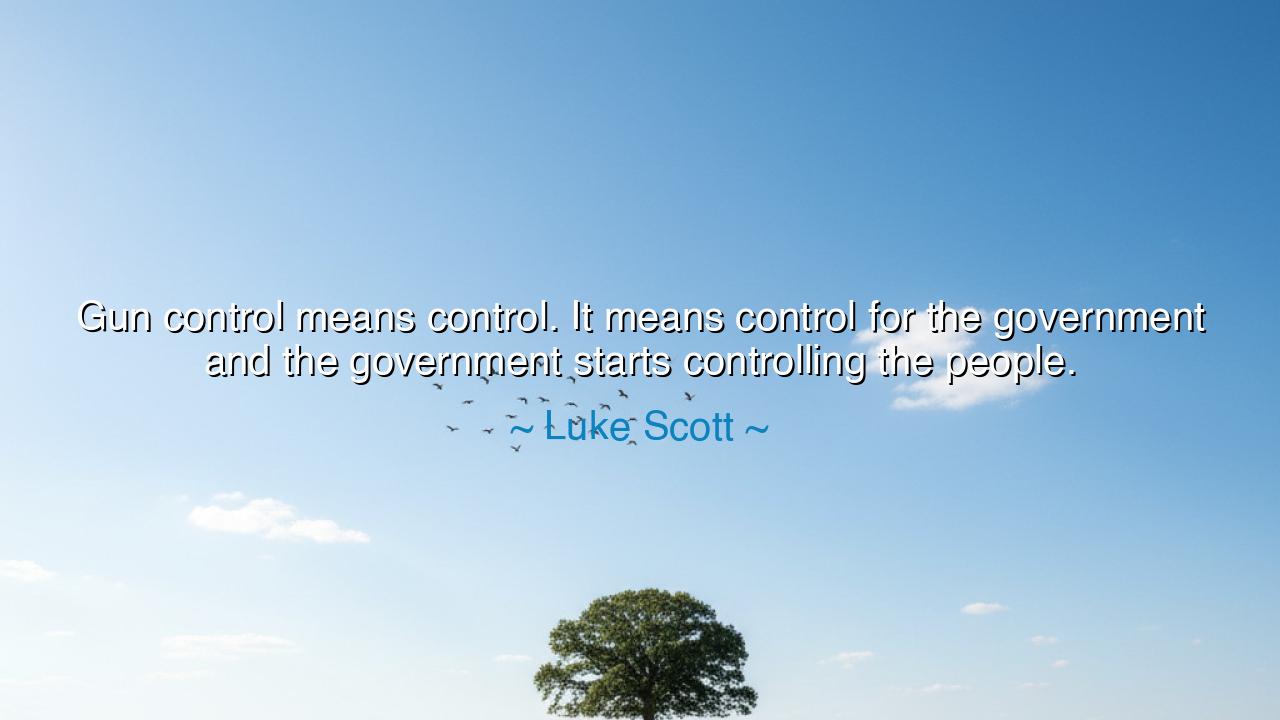
Gun control means control. It means control for the government
Gun control means control. It means control for the government and the government starts controlling the people.






The words of Luke Scott, though spoken in a modern age, echo with the ancient fear and wisdom that dwell at the heart of all free men: “Gun control means control. It means control for the government and the government starts controlling the people.” In this short but thunderous declaration lies a truth as old as civilization itself—that the balance between power and liberty is as fragile as glass, and that when the sword of the state grows heavy while the hands of the people are made empty, the chain of tyranny is soon forged. For every empire that has fallen into despotism began first by disarming its citizens, not of weapons alone, but of the means to resist, to stand, and to speak.
The origin of this quote comes from Luke Scott, a former Major League Baseball player known not only for his skill on the field but for his bold and controversial opinions. Though not a philosopher or politician, his words resonate with the spirit of independence deeply rooted in the American tradition. He spoke from conviction, believing that the right to bear arms was not a mere privilege granted by the government, but a safeguard placed by the Founders to protect citizens from the government itself. His statement was not about the metal of guns, but the metal of freedom—the idea that power, once centralized, rarely loosens its grip without a fight.
In the style of the ancients, let us ponder this truth. Control, as Scott uses the word, is no mere administration—it is dominion. It is the hand that once promised protection but slowly begins to squeeze. To take from a people their means of defense, whether physical, moral, or spiritual, is to place them in the care of those who may one day forget mercy. History has shown, time and again, that the state which claims to protect its people often ends by ruling them. And when the citizens no longer possess the means to resist, their freedom becomes a memory written only in stone and blood.
Consider the great tragedy of the Weimar Republic in Germany. After the First World War, strict gun laws were enacted to preserve order and prevent rebellion. But when Adolf Hitler rose to power, these same laws made it easy for his regime to suppress opposition. Those who resisted—Jews, dissenters, and freedom lovers—were powerless to defend themselves against the machinery of the state. The disarming of the people became the foundation of total control, and the right to self-defense was replaced by the rule of terror. So it has been with many nations: where the people surrender their power to the promise of safety, they awaken to find that they have exchanged safety for servitude.
Yet, the heart of Scott’s message is not violence—it is vigilance. He warns that the struggle for liberty is not waged only with arms, but with awareness. A citizen who ceases to question, who trusts too easily in authority, is already half-enslaved. For government, like fire, is both servant and master: when contained, it warms; when unchecked, it consumes. The Second Amendment, to Scott and to many who share his view, is not about hunting or sport—it is the final barrier between freedom and subjugation, a reminder that sovereignty belongs first to the people, and only then to those they govern.
In truth, this idea stretches far beyond America. The ancient Greeks, who gave birth to democracy, understood that a free citizen must be both thinker and defender. The Romans, too, knew that liberty fades when citizens grow soft, preferring comfort over courage. Even the Revolutionary War itself was born of the belief that the people have a sacred duty to resist oppression. The musket, in that time, was not a weapon of chaos but a symbol of resolve. It said to the world: “We will govern ourselves, and no king shall rule us by fear.”
So, my children of the future, take this teaching not as a call to arms, but as a call to awareness and responsibility. Understand that every right, once surrendered, is not easily regained. Freedom is not a gift handed down by rulers—it is a torch that must be kept alight by every generation. To bear that torch means more than owning weapons; it means possessing the courage to stand for truth, the wisdom to question power, and the resolve to defend the innocent against injustice.
For as Luke Scott reminds us, the essence of gun control is not about guns—it is about control. And when control passes wholly into the hands of the state, liberty becomes a whisper in the ruins of history. Let each of you, therefore, live as guardians of your own conscience, protectors of your own freedom, and teachers of your own children. For in the vigilance of free men and women lies the eternal defense of all that is sacred: the right to live not as subjects, but as sovereign souls beneath the wide and watchful sky of liberty.






AAdministratorAdministrator
Welcome, honored guests. Please leave a comment, we will respond soon